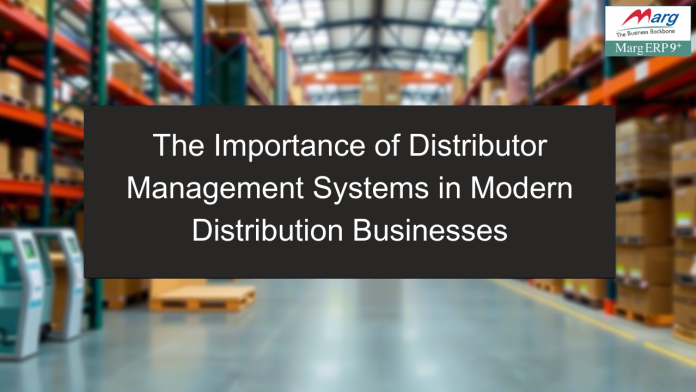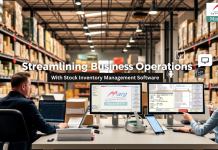In today’s fast-paced and highly competitive business environment, the distribution industry plays a pivotal role in ensuring that products reach consumers efficiently and effectively. From small-scale enterprises to large multinational corporations, businesses rely heavily on their distribution networks to meet customer demands, maintain inventory levels, and optimize operational costs. However, managing a distribution business is no simple task. It involves coordinating with multiple stakeholders, handling complex logistics, and ensuring seamless communication between suppliers, distributors, and retailers. This is where Distribution Management Software becomes indispensable.
This blog delves into the critical aspects of distributor and management system, their role in streamlining operations, and why they are essential for modern distribution businesses. Whether you’re new to the concept or looking to upgrade your existing processes, this guide will provide valuable insights into how these systems can transform your operations.
What is a Distributor Management System?
A Distributor and Management System is a comprehensive software solution designed to help businesses manage their relationships with distributors, streamline supply chain operations, and enhance overall efficiency. At its core, provides tools for order management, inventory tracking, sales analysis, and performance monitoring. By centralizing data and automating key processes, it empowers businesses to make informed decisions, reduce manual errors, and improve collaboration across the distribution network.
For businesses operating in industries such as FMCG (Fast-Moving Consumer Goods), pharmaceuticals, electronics, and retail, a robust can be a game-changer. It not only simplifies day-to-day operations but also enables scalability, allowing companies to expand their reach without compromising on quality or service.
Why Do We Need Distribution Management?
Before diving deeper into the functionalities, let’s first understand why distribution management is crucial for any business involved in product distribution. The need for effective distribution management arises from several challenges faced by businesses:
Complex Supply Chains
Modern supply chains are intricate webs involving multiple players—manufacturers, wholesalers, distributors, retailers, and end consumers. Managing these relationships manually can lead to inefficiencies, miscommunication, and delays. Helps streamline these interactions by providing real-time visibility into every stage of the supply chain.
Inventory Management Challenges
Maintaining optimal inventory levels is one of the biggest hurdles for distribution businesses. Overstocking ties up capital, while understocking leads to lost sales opportunities. With advanced forecasting and analytics capabilities, ensures that inventory levels are aligned with demand patterns, minimizing waste and maximizing profitability.
Order Fulfillment Issues
Timely order fulfillment is critical to maintaining customer satisfaction. Errors in processing orders, delayed shipments, or incorrect deliveries can damage a company’s reputation. Automates order processing workflows, reducing human error and ensuring faster, more accurate deliveries.
Lack of Data-Driven Insights
Without access to actionable data, businesses struggle to identify trends, predict future demand, and evaluate distributor performance. Collects and analyzes data from various touchpoints, enabling businesses to make strategic decisions based on facts rather than assumptions.
Growing Competition
In an increasingly crowded marketplace, businesses must differentiate themselves through superior service and efficiency. A well-implemented gives companies a competitive edge by improving operational agility and enhancing customer experiences.
Key Features of a Distributor Management System
To address the above challenges offers a wide range of features tailored to meet the unique needs of distribution businesses. Some of the most important functionalities include:
Order Management
Efficient order management lies at the heart of any successful distribution operation. Allows businesses to process orders seamlessly, track their status in real time, and generate invoices automatically. This eliminates bottlenecks and ensures timely delivery.
Inventory Tracking
Real-time inventory tracking is another cornerstone feature. By integrating with warehouse management systems, it provides accurate stock updates, alerts users about low inventory levels, and suggests reorder points based on historical data.
Sales and Performance Analytics
Understanding distributor performance is vital for identifying top performers and addressing underperformance. Generates detailed reports on sales figures, profit margins, and other key metrics, helping businesses refine their strategies.
Route Optimization
For businesses dealing with physical goods, route optimization can significantly reduce transportation costs and delivery times. Uses algorithms to determine the most efficient routes, taking into account factors like traffic conditions, fuel consumption, and vehicle capacity.
Customer Relationship Management (CRM)
Building strong relationships with distributors and retailers is essential for long-term success. A Distributor Management System often includes CRM tools that enable businesses to track interactions, resolve issues promptly, and foster loyalty among partners.
Mobile Accessibility
In today’s mobile-first world, having access via smartphones and tablets is a major advantage. Mobile apps allow field staff to update records, place orders, and communicate with headquarters on the go, ensuring uninterrupted workflow.
Benefits of Implementing a Distributor Management System
Now that we’ve explored the features, let’s examine the tangible benefits it brings to distribution businesses:
Improved Efficiency
Automation is one of the primary advantages. By automating repetitive tasks like order entry, invoicing, and inventory updates, businesses can save time and allocate resources more effectively.
Enhanced Collaboration
A centralized platform fosters better collaboration between manufacturers, distributors, and retailers. Everyone has access to the same information, reducing misunderstandings and fostering trust.
Cost Savings
Reduced operational costs are a direct result of improved efficiency and minimized errors. For example, optimized routes lower fuel expenses, while accurate inventory management prevents overstocking and wastage.
Scalability
As businesses grow, their distribution networks become more complex. A scalable Distributor Management System adapts to changing requirements, supporting expansion without requiring significant additional investments.
Data Security
With cyber threats becoming increasingly sophisticated, protecting sensitive business data is paramount. A Distributor Management System employs advanced security protocols to safeguard information against unauthorized access and breaches.
Better Customer Satisfaction
Faster order processing, accurate deliveries, and proactive issue resolution contribute to higher customer satisfaction. Happy customers are more likely to remain loyal and recommend your services to others.
How to Choose the Right Distributor Management System
Selecting the right Distributor Management System for your business requires careful consideration of several factors:
Business Size and Complexity
Smaller businesses may benefit from simpler, cost-effective solutions, while larger enterprises might require more advanced features and customization options.
Integration Capabilities
Ensure that the Distributor Management System integrates smoothly with your existing systems, such as ERP (Enterprise Resource Planning) software, accounting tools, and e-commerce platforms.
User-Friendliness
The system should have an intuitive interface that minimizes the learning curve for employees. Training sessions may still be necessary, but a user-friendly design accelerates adoption.
Scalability
Choose a solution that grows with your business. Look for modular designs that allow you to add new features as needed.
Vendor Support
Reliable technical support is crucial for resolving issues quickly and keeping the system running smoothly. Evaluate vendors based on their responsiveness and expertise.
Conclusion: Embrace Technology for Sustainable Growth
In conclusion, the need for distribution management stems from the inherent complexities of modern supply chains and the ever-evolving expectations of customers. A Distributor Management System serves as the backbone of a successful distribution business, offering tools to streamline operations, enhance collaboration, and drive growth.
By investing in the right Distributor Management System, businesses can overcome traditional challenges, stay ahead of the competition, and build lasting relationships with distributors and customers alike. As technology continues to evolve, embracing innovative solutions like a Distributor Management System will be key to achieving sustainable success in the dynamic world of distribution.
If you’re ready to take your distribution business to the next level, consider exploring the possibilities offered by a robust distributor management system. After all, in today’s digital age, staying relevant means staying connected—and a Distributor Management System is your gateway to seamless connectivity and unparalleled efficiency.
Read more:
- The Importance of Distributor Management Systems in Modern Distribution Businesses
- Streamlining Business Operations with Stock Inventory Management Software
- Streamline Your Jewellery Business with the Right ERP Solutions
- How Accounting Software Simplifies GST and Follows the Golden Rules of Accounting
- Exploring Different Types of Billing and the Software for Distributors




















